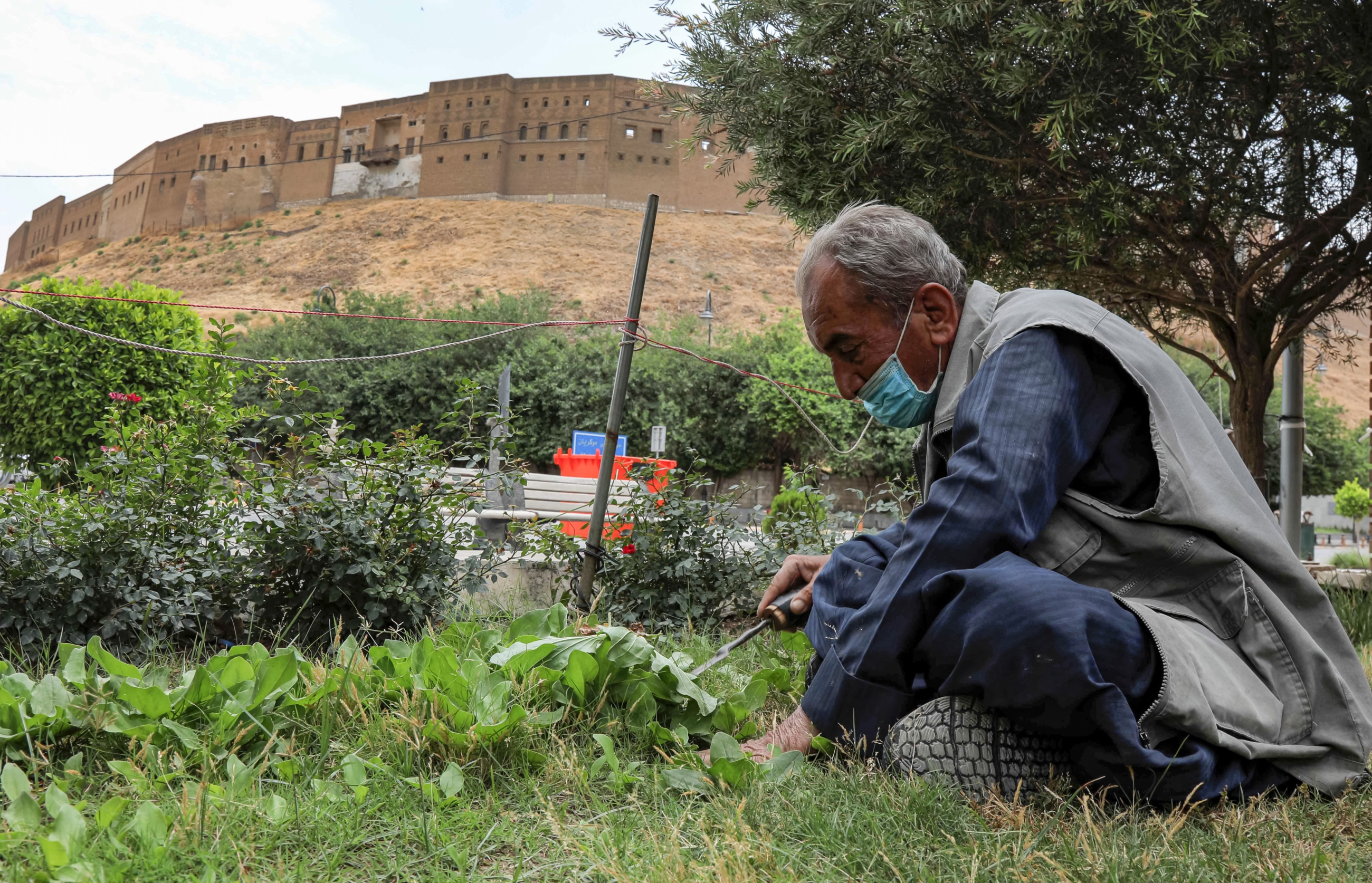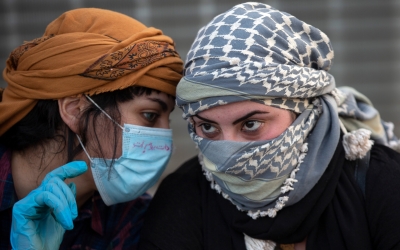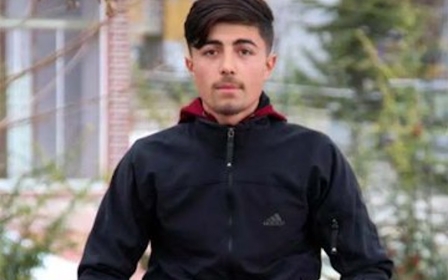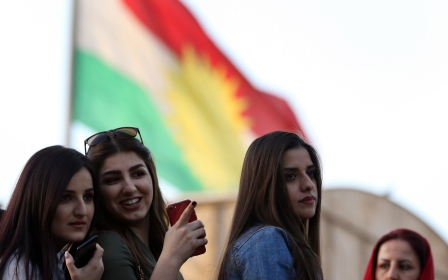Anger at 'politicisation' of coronavirus provokes unrest in Iraq's Kurdish region

Political parties in Iraq's autonomous Kurdish region have traded accusations of politicising the coronavirus pandemic for their own gains, as the region sees a new spike in infections.
According to statistics released by the Kurdistan Regional Government (KRG), as of Monday there were 1,312 confirmed cases of Covid-19, with 26 deaths, 448 recoveries and an overall two percent morality rate.
Anger at what has been as a cynical and opportunistic imposition of lockdown measures has spilled over into street protests.
On 30 May, Shaswar Abdulwahid, leader of the opposition New Generation (NG) party, called for “toppling the KRG” through massive demonstrations all over the region.
Abdulwahid is also owner of NRT, a Kurdish satellite channel and news site, which has repeatedly broadcast speeches by locals claiming the KRG is “fabricating” coronavirus infection data for political gain.
New MEE newsletter: Jerusalem Dispatch
Sign up to get the latest insights and analysis on Israel-Palestine, alongside Turkey Unpacked and other MEE newsletters
The next day, the KRG announced more than 100 infections of coronavirus in the region, mostly in the NG stronghold of Sulaymaniyah, the highest single-day total infection in the region since the outbreak began.
Consequently, the KRG imposed a six-day lockdown across all the region’s three provinces until 6 June. Abdulwahid, in a televised speech, accused the KRG’s ruling parties of politicising the pandemic, claiming the government was “announcing fake data to terrify people not to take part in large demonstrations and hide its failures”.
The people of Sulaymaniyah and its surrounding areas took to the streets on on 1 June - without wearing masks and gloves - to demand the lifting of the lockdown measures.
The demonstrations eventually reached as far as the outskirts of Erbil and Duhok provinces. KRG security forces eventually dispersed all demonstrators by shooting live bullets in the air and arresting and beating a number of journalists.
Though Iraq as a whole is seeing a new spike in coronavirus infections, KRG residents are becoming increasingly cynical about attempts by politicians to impose restrictions on their lives.
“I do not believe in coronavirus,” said Azad, a 35-year-old Kurdish shopkeeper talking to Middle East Eye during a demonstration in Sulaymaniyah.
“It is a lie, we have passed over the pandemic.”
'Not dangerous'
KRG officials announced the first cases of coronavirus in early March, tightening prevention and lockdown measures until mid-May, when the KRG gradually eased the measures and opened most businesses.
“Coronavirus is not dangerous in the Kurdistan Region, but the virus poses a threat to the world and neighbouring countries, so we need to follow the health regulations,” said KRG Minister of Health Saman Barzinji at a 10 May press conference.
Prime Minister Masrour Barzani’s cabinet faces a serious financial crisis due to the drop in international oil prices and lockdown measures. Barzani, who is from the ruling Kurdistan Democratic party (KDP), on 22 May said that the region was under $27bn of local and international debt.
The government has yet to pay February salaries to more than 1.2 million people on the public sector payroll, including in the health sector.
Since 15 May the region’s provinces have witnessed a wave of public demonstrations over the KRG’s failure to pay salaries and find jobs for the unemployed.
The backlash from a public already suffering from a lack of jobs and pay over the lockdown led to the government quickly revoking the new measures on 3 June, instead stressing the need for self-protecting measures by people in all public places and governmental offices.
At the same time - based on orders from the KRG’s minister of the interior - the prosecutor general issued an arrest warrant against Abdulwahid on charges of “urging people not to abide by Covid-19 protection measures”.
Abdulwahid, and Kazim Faruq, head of the NG fraction in the Kurdistan parliament, declined to respond to MEE’s requests for comment.
In the days after the demonstrations, more infections and deaths due to the coronavirus were recorded on a regular daily basis in the region - while the price of surgical masks has risen to more than $12 per one pack.
'Legitimate rights'
Mohammed Qadir, the official spokesperson for the KRG’s health ministry, on 2 June told MEE: “We do not have any interest in playing out with Covid-19 infection data. Our data is real, accessible to the World Health Organisation, and it is predictable if compared to the region’s nearly five million population.
“The reasons behind the sudden hike in confirmed cases are there were wide gatherings at the end of Ramadan month and Eid days without self-protection measures; many people entered the region from other parts of Iraq and returned from neighbouring Iran illegally. The real danger is that the virus is everywhere in the community.”
'We understand that the current situation is adversely affecting the livelihoods of people in Kurdistan'
- Lahur Talabany, PUK
He cautioned that since most people in the demonstrations were not putting on masks or gloves and were very close to each other, infection cases were expected to rise sharply within the next two or three weeks.
The KRG’s other ruling parties - the Patriotic Union of Kurdistan (PUK) and the Change Movement (Gorran) - have different views regarding the KDP’s Covid-19 measures
“We understand that the current situation is adversely affecting the livelihoods of people in Kurdistan. We offer them our support and we are doing our utmost to ensure that they can go back to work as soon as possible while adhering to health and safety guidelines,” Lahur Talabany, co-president of the PUK, wrote in a tweet.
Gorran’s parliamentary group in a statement said they supported the “legitimate rights” of people, calling on the KRG PM and related ministers to attend the Kurdistan parliament to discuss the issues of salaries, people’s living conditions, tackling corruption and the $27bn debt.
'Political competition'
Abu Bakr Haladni, head of the parliamentary fraction of the Kurdistan Islamic Union (KIU), said the ruling parties had politicised the pandemic and made it a political competition and media war.
“What created suspicion for the people of Kurdistan were different responding approaches towards the pandemic by the two deferent ruling administrations within the KRG; one in Sulaymaniyah run by the PUK and the other in Erbil under the KDP,” Haladni told MEE in a phone interview.
“Authorities in both zones even announced different statements, making the pandemic a political issue.”
He added that all the other opposition parties had reacted to the pandemic with “sensitivity” and “responsibly”.
He said the opposition officials and media cooperated with the government in raising the awareness among people and urging them to abide by the prevention measures.
'The data is real'
Dr Wael Hatahet, head of the WHO’s emergency team in Iraq, said that they had been facing similar suspicions towards coronavirus data in Baghdad.
“The KRG’s Covid-19 data is accessible to the WHO, yes, I want to confirm to people the data is real,” Hatahet told MEE during a phone interview.
He added, however, that it was too soon to judge if the new spike was representative of a second wave of the virus, or if it was just isolated incidents.
Diliman Abdulkader, co-founder and spokesperson for the Washington-based advocacy and education organisation American Friends of Kurdistan, told MEE that the pandemic had “been politicised by all sides, including the opposition”.
“For the ruling KDP party, it has been used as a tool to show the international community their abilities,” he said.
“For the opposition parties, it’s an easy opportunity to capitalise on the crisis … both sides have risked people’s lives. But ultimately the responsibility is on the government.”
Middle East Eye delivers independent and unrivalled coverage and analysis of the Middle East, North Africa and beyond. To learn more about republishing this content and the associated fees, please fill out this form. More about MEE can be found here.





